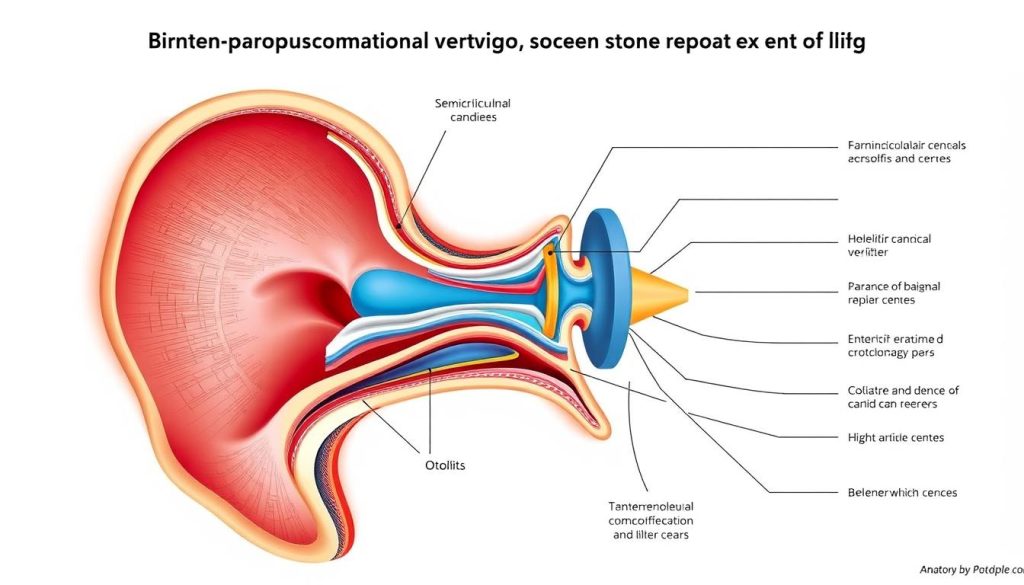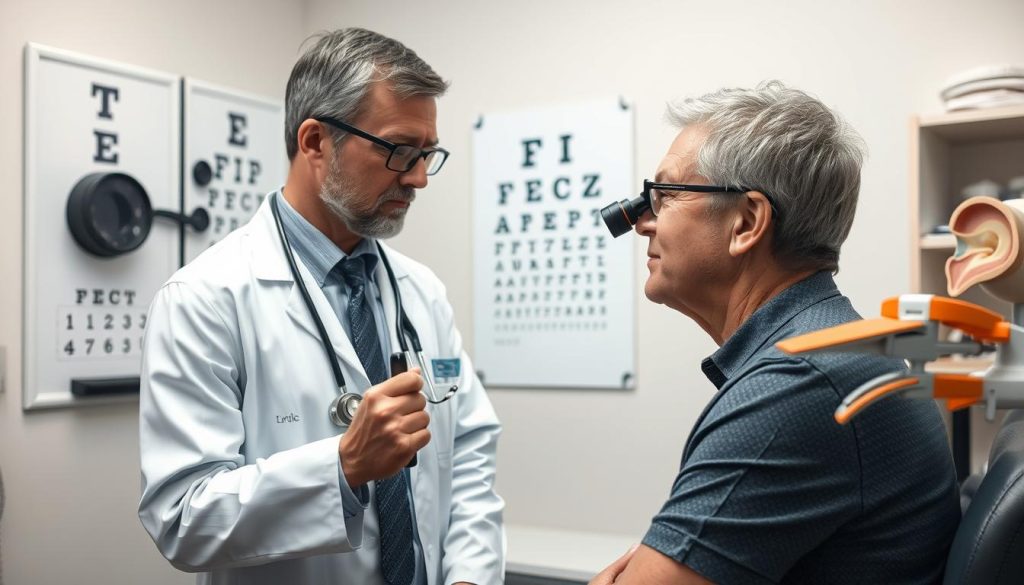Vertigo makes you feel like you’re spinning or dizzy. It can really mess up your day. Many people wonder if it runs in families. Is vertigo passed down through genes? While many things can cause vertigo, genes play a big part in some cases.
Some vertigo comes from genes that affect the inner ear or brain’s balance centers. These genes can make you more likely to get certain types of vertigo. Knowing about the genetic link is key to catching it early and treating it.
Looking at your family history can help figure out if you might get vertigo. Like other conditions with a genetic link, spotting patterns in your family can guide doctors. This helps them create better treatment plans for you.
Understanding Vertigo and Its Basic Mechanisms
Vertigo makes you feel like you’re spinning or dizzy. It can really mess up your day. It happens because of problems in the inner ear, which is key for balance. Let’s look at how vertigo works and its different forms.
The Inner Ear’s Role in Balance
The inner ear has tiny parts that sense head movements and changes in position. If these parts don’t work right, you might feel vertigo. The vestibular system, with its semicircular canals and otolith organs, helps keep us balanced.
How Vertigo Affects Daily Life
Vertigo can make everyday things hard. It can make simple tasks tough. People with vertigo might find it hard to:
- Walk or stand up straight
- Drive or use machinery
- Read or look at screens
- Go to social events
Different Types of Vertigo Episodes
Vertigo episodes can be short or last a while. Benign paroxysmal positional vertigo (BPPV) is common. It causes quick, strong dizziness when you move your head. Other types, like Ménière’s disease and vestibular neuritis, have their own patterns and reasons.
| Vertigo Type | Duration | Key Characteristics |
|---|---|---|
| BPPV | Seconds to minutes | Triggered by head movements |
| Ménière’s disease | 20 minutes to hours | Accompanied by hearing loss and tinnitus |
| Vestibular neuritis | Days to weeks | Sudden onset, often after viral infection |
Knowing how vertigo works helps you spot symptoms and find the right treatment. If you keep feeling dizzy or like you’re spinning, see a doctor. They can help figure out what’s wrong and how to fix it.
Is Vertigo Hereditary: Exploring Genetic Links
Research shows vertigo might have genetic roots. Scientists found links between balance disorders and family history. This makes us wonder: is vertigo hereditary?
Studies on vertigo in families show interesting patterns. Some families have more balance issues over generations. This suggests a genetic link to vertigo.
Specific genes can make people more likely to get vertigo. For example, the COCH gene is linked to rare hereditary vertigo. This gene is important for the inner ear’s structure, which helps with balance.
Another gene, CACNA1A, is connected to familial hemiplegic migraine. This condition often includes vertigo. These findings support the idea that vertigo can be passed down through genes.
“Genetic factors contribute to about 50% of vertigo cases,” states Dr. Emily Chen, a leading researcher in vestibular disorders.
Not all vertigo is caused by genes, but knowing about genetic links is important. If you have a family history of balance issues, talk to your doctor. This can lead to better care for you.
Research is still going on to learn more about vertigo’s genetic side. This knowledge helps improve how we diagnose and treat vertigo in families.
Common Causes of Hereditary Vertigo Conditions
Vertigo can have many causes, but some are inherited. Hereditary vertigo comes from certain family disorders and genetic changes. Knowing these factors helps us understand why some people get dizzy and have balance problems more often.
Familial Vestibular Disorders
Some families are more likely to get vertigo because of inherited ear problems. These issues affect the inner ear and cause frequent dizziness. For example, familial episodic ataxia leads to sudden balance and vertigo attacks.
Genetic Mutations Affecting Balance
Genetic changes can mess with our balance system. For instance, changes in the COCH gene are linked to DFNA9, a type of progressive hearing loss. These genetic issues can harm the inner ear’s structure, causing balance problems over time.
Inherited Inner Ear Conditions
Some ear disorders are passed down in families. Ménière’s disease, with its vertigo, hearing loss, and tinnitus, might have a genetic link. While not always inherited, having a family member with Ménière’s raises your risk.
Knowing about these hereditary causes helps doctors treat patients better. If you have a family history of balance issues, talking to your doctor can help manage your condition.
Benign Paroxysmal Positional Vertigo (BPPV) and Family History
Benign paroxysmal positional vertigo (BPPV) is a common cause of dizziness. Research shows a possible link between BPPV and family history. Studies suggest that people with a family member who has BPPV might be at higher risk.

Genetic factors might play a role in BPPV development. Scientists have found specific genes linked to inner ear problems. These genes might increase the risk of BPPV. Knowing these genetic connections helps doctors diagnose and treat BPPV in families.
“Family history can be a valuable clue in diagnosing BPPV. Patients with relatives who have experienced similar symptoms often receive more targeted evaluations,” says Dr. Emily Chen, a leading vestibular specialist.
While there are familial vertigo patterns, having a family member with BPPV doesn’t mean you’ll get it. Environmental factors and lifestyle choices also affect your risk. Regular check-ups and talking about your family history with a healthcare provider can help early detection and management of BPPV.
| Factor | Impact on BPPV Risk |
|---|---|
| Family History | Moderate increase |
| Age (over 50) | Significant increase |
| Head Trauma | High increase |
| Inner Ear Infections | Moderate increase |
Migrainous Vertigo: The Genetic Connection
Migrainous vertigo combines migraine symptoms with vertigo and has strong genetic ties. Studies show it often runs in families, pointing to a hereditary link. Understanding these genetic links can lead to better treatment options for vertigo.
Family Patterns in Vestibular Migraines
Research shows people with a family history of migraines are more likely to have migrainous vertigo. This pattern shows the genetic influence on this condition. Recent genetic advances have shed light on the familial nature of vestibular migraines. This opens new avenues for understanding and treating this disorder.
Inherited Risk Factors for Migrainous Vertigo
Certain genetic mutations may increase the risk of developing migrainous vertigo. These inherited factors can affect the inner ear’s balance system or the brain’s processing of sensory information. Identifying these genetic markers can help in early diagnosis and prevention strategies.
Treatment Approaches for Genetic Vertigo
Vertigo treatment for genetically linked cases often requires a personalized approach. This may include:
- Targeted medications based on genetic profiles
- Vestibular rehabilitation exercises
- Lifestyle modifications to manage triggers
- Regular monitoring for family members at risk
By considering the genetic aspects of migrainous vertigo, healthcare providers can offer more effective and tailored treatment plans. This approach not only addresses current symptoms but also helps in managing long-term risks associated with inherited vertigo conditions.
Diagnosing Hereditary Vertigo Conditions
Diagnosing genetic vertigo needs a detailed approach. Doctors use different methods to find out if vertigo runs in families.
Medical History Assessment
Understanding a patient’s medical history is key. Doctors look at family backgrounds, symptom patterns, and what triggers them. This helps find if vertigo is inherited.
Genetic Testing Options
Genetic tests are crucial for finding hereditary vertigo. They can spot specific gene changes linked to balance problems.
| Test Type | Purpose | Advantages |
|---|---|---|
| Single Gene Testing | Identifies mutations in specific genes | Precise diagnosis for known genetic causes |
| Panel Testing | Examines multiple genes simultaneously | Efficient for complex genetic conditions |
| Whole Exome Sequencing | Analyzes all protein-coding genes | Comprehensive genetic overview |
Physical Examination Procedures
Physical exams are vital for diagnosing vertigo. Doctors check balance, eye movements, and hearing. These tests help figure out what kind of vertigo someone has and how severe it is.

By looking at medical history, genetic tests, and physical exams, doctors can accurately diagnose hereditary vertigo. They can then create specific treatment plans.
Treatment Options for Genetic Vertigo Disorders
Genetic vertigo disorders need special treatments. Doctors create plans based on each patient’s genes and symptoms. This way, they manage hereditary vertigo better.
Medicines are important for vertigo symptoms. Doctors might give anti-nausea drugs to help with dizziness and vomiting. Some people get vestibular suppressants to calm their balance centers.
Vestibular rehabilitation therapy is very helpful. It’s an exercise program that helps the brain get used to balance problems. Patients learn how to reduce dizziness and stay stable.
- Balance retraining exercises
- Gaze stabilization techniques
- Habituation exercises
Sometimes, surgery is needed for severe vertigo. Procedures like labyrinthectomy or vestibular nerve section can help. These are options when other treatments don’t work.
Changing your lifestyle can also help with genetic vertigo. Stress reduction, better diet, and regular sleep are good. These changes can reduce vertigo episodes and improve life quality.
Prevention and Management Strategies
Dealing with a genetic risk for vertigo can be challenging. But, there are ways to prevent and manage symptoms. Let’s look at some key strategies to help those with familial vertigo live better lives.
Lifestyle Modifications
Small changes can make a big difference. Eating a balanced diet, staying hydrated, and getting enough sleep can help reduce vertigo episodes. Regular exercise, like yoga or tai chi, can improve balance and lessen symptoms. Cutting back on caffeine, alcohol, and salt may also help some people feel better.
Regular Medical Monitoring
Keeping track of your health is vital for effective vertigo treatment. Regular check-ups with your doctor can catch problems early. They might suggest tests to watch your inner ear function or balance. This close monitoring helps adjust your care plan as needed, keeping you on top of your health.
Family Planning Considerations
If you have familial vertigo, you might worry about passing it to your kids. Talking to a genetic counselor can help you understand your risks. They can explain your options and help you make informed choices about starting a family. Remember, many people with genetic vertigo lead full, happy lives with proper care and support.
FAQ
Q: Is vertigo hereditary?
A: Vertigo isn’t always passed down through families. But, some types of vertigo might have a genetic link. This means some families might see more cases of vertigo. Yet, many cases of vertigo come from other causes, not just genes.
Q: What are the main causes of vertigo?
A: Vertigo can come from several sources. Inner ear problems, like BPPV, are common causes. So are vestibular neuritis, Meniere’s disease, migraines, and injuries to the head or neck. Some medications can also cause vertigo. Genes might make some people more likely to get these conditions.
Q: How is hereditary vertigo diagnosed?
A: Doctors use a few steps to find hereditary vertigo. They start with a detailed look at your medical and family history. Then, they do physical exams and balance tests. They might also do genetic tests and imaging studies like MRI to check for other causes.
Q: What is familial vertigo?
A: Familial vertigo happens when many family members get vertigo. This suggests a genetic link. It includes some migraines, Meniere’s disease, and other inherited vestibular disorders.
Q: Can benign paroxysmal positional vertigo (BPPV) be hereditary?
A: BPPV often comes from aging or head injuries. But, some studies hint at a genetic link in some cases. Still, most BPPV isn’t passed down through families.
Q: What is migrainous vertigo and is it genetic?
A: Migrainous vertigo, or vestibular migraine, is vertigo linked to migraines. It seems to run in families, suggesting a genetic link. People with a family history of migraines might be more likely to get it.
Q: What treatment options are available for genetic vertigo disorders?
A: Treatments for genetic vertigo include medicines and therapy. Lifestyle changes and sometimes surgery are also options. The best plan depends on the condition and symptoms.
Q: Are there prevention strategies for those with a family history of vertigo?
A: You can’t change your genes, but you can prevent vertigo. Regular check-ups and a healthy lifestyle are key. Avoiding triggers and managing stress also help. Genetic counseling can guide family planning.
Q: How does genetic testing help in vertigo diagnosis?
A: Genetic tests find specific mutations linked to vertigo. This helps confirm a diagnosis and predict risks. It also guides treatment and informs family members about their own risks.
Q: What are some common symptoms of hereditary vertigo conditions?
A: Symptoms include feeling like you’re spinning or dizzy. You might have trouble balancing, nausea, or vomiting. Some people experience hearing loss or tinnitus. Headaches and visual problems are also common, especially in migrainous vertigo. The symptoms vary by condition.


















